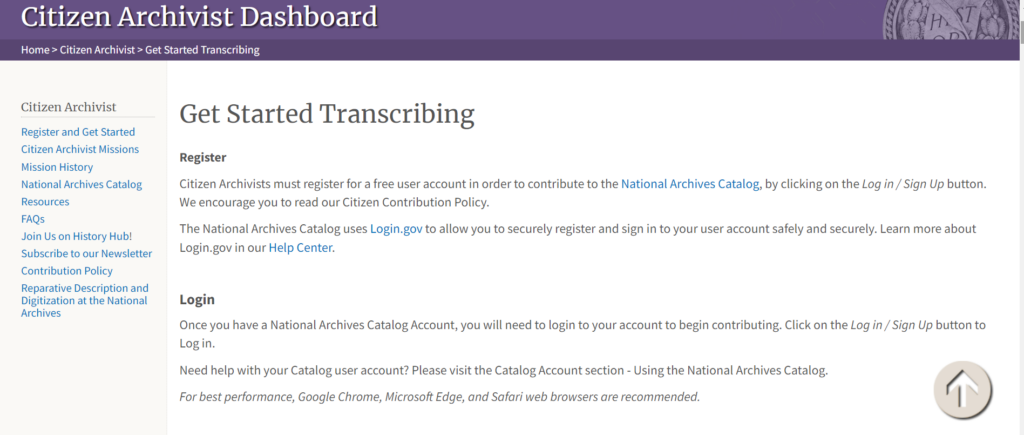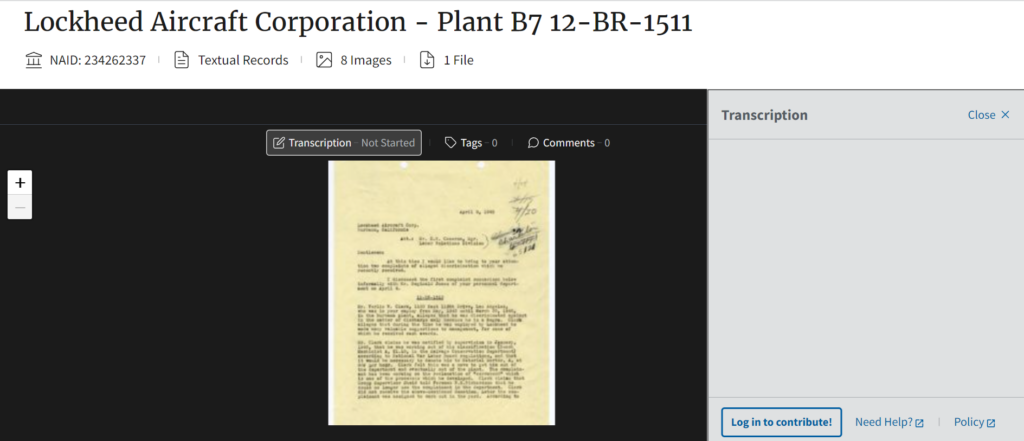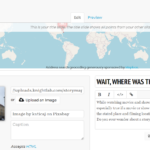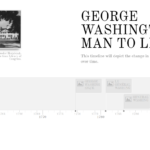The Citizen Archivist transcription feature on the National Archives website is easy to use. They have a variety of subjects to choose from. Right now they have transcription projects on: UFOs, Revolutionary War Pension Files, World War II Oral Histories and Interviews, and Records of the Committee on Fair Employment Practice. For the sake of reviewing their transcription projects, I chose to transcribe a document from their project on Fair Employment Practice.
The top of the Citizen Archivist Missions page, which is where you can find these projects, is information on how to get started with volunteering. They host hyperlinks to pages for tips on how to transcribe a page. The tutorial features static pages, but it shows step-by-step instructions on transcription, featured on the right.

To get started transcribing, you do need to set up an account (free, of course). They provide a direct link to this as well, and all you need to do is sign up with your name and email address, then verify your email. As soon as your email is verified, you can start transcribing.
Transcribing a page is very simple. Citizen Archivist makes it clear they want the transcription to be as close to the document as possible, which answers questions surrounding whether or not you should include page numbers in your transcription. I transcribed pages five and six of two written complaints of racial discrimination being brought to the attention of Lockheed’s Aircraft Corporation in 1945 (below).

The process was simple and quick. The document was on the left, and the textbox for transcription was on the right, making it easy to look at the document and type at the same time. You can also grab and drag the document and zoom in and out to get a better look at what you are transcribing. The digitized documents are of high quality, which makes this easy to do. However, I will note I was transcribing a document that was originally typed. Some documents are handwritten, and as cursive writing practices are dying out, this can be something difficult to transcribe without practice.
Why Crowdsourcing?
Using crowdsourcing for projects such as transcription really is best practice, since it is a tedious task. I transcribed two pages and was finished with the task altogether. However, the work needs to be done. It is helpful for historians to have digitized collections and records, because they can be more readily accessed and can help others outside the institution with their own research (if available).
The work is not bad, but it isn’t something a handful of people could or should do for eight hours straight. If transcribing is someone’s absolute passion, have at it. I for one, do not have the patience to do more than a few pages at a time, and I doubt many people could. A team of people would groan at the thought of transcribing 10,000 documents. However, if their institution reached out to the public to help with transcribing, that team grows from one to ten to a couple hundred, or thousands of people. Trevor Owens’ blog posts dive into why crowdsourcing works. In his “Software as Scaffolding and Motivation and Meaning: The How and Why of Crowdsourcing,” Owens talks about the intrinsic sense of motivation people have. After securing food, shelter, and other basic needs, people search for meaning, and this can be provided by museums and historic sites. The need to belong or be a part of something bigger is something a lot of people yearn for, and this includes aiding to provide a resource such as digitized and transcribed records, for people (professionals and those who Owens lovingly referred to as “amateurs” in the true definition of the word), to be able to use for future research.
Sure, I was quickly bored after transcribing just a few pages from one of the Citizen Archivist projects, but what was engaging was taking a closer look at a document I otherwise would not have looked at or known about. Another thing to note, is transcribing usually relies on people who are passionate about the project. This is probably one reason why Citizen Archivist has different projects open. It’s important to note that I chose the project on the Committee of Fair Employment Practices because I am passionate about labor history, more so than the other transcription projects they offered (though I WILL be taking a look at the UFO documents).
Have you taken part in transcribing or reviewing historical documents? What was your experience like?

